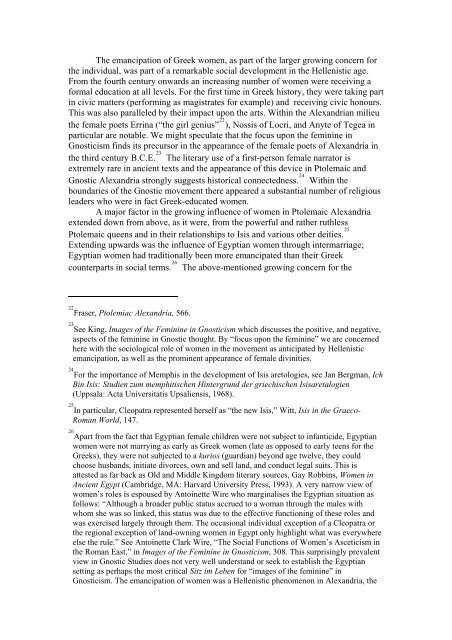THE EGYPTIAN FOUNDATIONS OF GNOSTIC THOUGHT
THE EGYPTIAN FOUNDATIONS OF GNOSTIC THOUGHT
THE EGYPTIAN FOUNDATIONS OF GNOSTIC THOUGHT
You also want an ePaper? Increase the reach of your titles
YUMPU automatically turns print PDFs into web optimized ePapers that Google loves.
The emancipation of Greek women, as part of the larger growing concern for<br />
the individual, was part of a remarkable social development in the Hellenistic age.<br />
From the fourth century onwards an increasing number of women were receiving a<br />
formal education at all levels. For the first time in Greek history, they were taking part<br />
in civic matters (performing as magistrates for example) and receiving civic honours.<br />
This was also paralleled by their impact upon the arts. Within the Alexandrian milieu<br />
the female poets Errina (“the girl genius” 22<br />
), Nossis of Locri, and Anyte of Tegea in<br />
particular are notable. We might speculate that the focus upon the feminine in<br />
Gnosticism finds its precursor in the appearance of the female poets of Alexandria in<br />
the third century B.C.E. 23<br />
The literary use of a first-person female narrator is<br />
extremely rare in ancient texts and the appearance of this device in Ptolemaic and<br />
Gnostic Alexandria strongly suggests historical connectedness. 24<br />
Within the<br />
boundaries of the Gnostic movement there appeared a substantial number of religious<br />
leaders who were in fact Greek-educated women.<br />
A major factor in the growing influence of women in Ptolemaic Alexandria<br />
extended down from above, as it were, from the powerful and rather ruthless<br />
Ptolemaic queens and in their relationships to Isis and various other deities. 25<br />
Extending upwards was the influence of Egyptian women through intermarriage;<br />
Egyptian women had traditionally been more emancipated than their Greek<br />
counterparts in social terms. 26<br />
The above-mentioned growing concern for the<br />
22<br />
Fraser, Ptolemiac Alexandria, 566.<br />
23<br />
See King, Images of the Feminine in Gnosticism which discusses the positive, and negative,<br />
aspects of the feminine in Gnostic thought. By “focus upon the feminine” we are concerned<br />
here with the sociological role of women in the movement as anticipated by Hellenistic<br />
emancipation, as well as the prominent appearance of female divinities.<br />
24<br />
For the importance of Memphis in the development of Isis aretologies, see Jan Bergman, Ich<br />
Bin Isis: Studien zum memphitischen Hintergrund der griechischen Isisaretalogien<br />
(Uppsala: Acta Universitatis Upsaliensis, 1968).<br />
25<br />
In particular, Cleopatra represented herself as “the new Isis,” Witt, Isis in the Graeco-<br />
Roman World, 147.<br />
26<br />
Apart from the fact that Egyptian female children were not subject to infanticide, Egyptian<br />
women were not marrying as early as Greek women (late as opposed to early teens for the<br />
Greeks), they were not subjected to a kurios (guardian) beyond age twelve, they could<br />
choose husbands, initiate divorces, own and sell land, and conduct legal suits. This is<br />
attested as far back as Old and Middle Kingdom literary sources, Gay Robbins, Women in<br />
Ancient Egypt (Cambridge, MA: Harvard University Press, 1993). A very narrow view of<br />
women’s roles is espoused by Antoinette Wire who marginalises the Egyptian situation as<br />
follows: “Although a broader public status accrued to a woman through the males with<br />
whom she was so linked, this status was due to the effective functioning of these roles and<br />
was exercised largely through them. The occasional individual exception of a Cleopatra or<br />
the regional exception of land-owning women in Egypt only highlight what was everywhere<br />
else the rule.” See Antoinette Clark Wire, “The Social Functions of Women’s Asceticism in<br />
the Roman East,” in Images of the Feminine in Gnosticism, 308. This surprisingly prevalent<br />
view in Gnostic Studies does not very well understand or seek to establish the Egyptian<br />
setting as perhaps the most critical Sitz im Leben for “images of the feminine” in<br />
Gnosticism. The emancipation of women was a Hellenistic phenomenon in Alexandria, the










